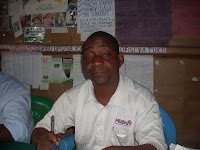 |
| Machinga Businss Complex |
 |
| Empty stalls in Machinga |
 |
| No one will go there to buy our goods! |
Across the football pitch on the other side stands the real market
for local kanga cloths – there is a dirt floor, leaking corrugated iron roofing
and the stalls are wooden self-constructed benches. There is no storage space
so the traders rent places in nearby houses. But business is good and many cooperative members are able to pay for school fees for their children from the sales. The kanga cooperative has 200
members and democratically elects its council every year.
 | |
| Anton, Cooperative President |
 | |
| Anton at his stall |
The cooperative
President and TUICO Branch Secretary, Anton, explained they were never consulted
about the new market.
“Why haven’t you moved to the new complex?” the visiting representatives of TUICO (Tanzanian Union of Industrial and Commercial Workers), and StreetNet asked.
“It is much too expensive – they are charging Tz$ 60,000 per
month and the stalls are much too small – it doesn’t suit our needs and no
customer is going to climb up the stairs to buy cloth from us there.”
“What would make you move there?” Nora Wintour, StreetNet campaigns coordinator asked.
“They would need to bring down the costs substantially and
change the design of the stalls. And we
would need to think about better public transport to get to the building", a
woman cooperative member explained.
 |
| Second-hand clothes seller |
A bit further away is the Ilala second-hand clothes market and
vegetable market. The cooperative members there are also members of TUICO and give the same story - “We can’t move there because it is much too
expensive – here we are charged $200 per day but there it is too much. And people don’t want to carry heavy loads of
clothing upstairs like that –and there is no transport. This market is here because it is near the
out-of-town buses and the sellers can arrive easily and take their goods to the
buses easily.”
Behind the second-hand clothes stall is an informal fruit
and vegetable market. We met the Chawana
coconut sellers cooperative, also a member of TUICO, and the vegetable sellers
cooperative. “We used to work around the
main central market at Kariakoo. But
then the police drove us away so we came here.
We are only allowed to trade between 6am-10 am. When the police blow the whistle, it is time
for us to leave. We try and push for longer, we want to trade all day. And the police are
often not correct- they should charge us
Tz$ 200 every day but sometimes they can ask for more- up to Tz$ 1000 or else
they will take our goods. Here the police make things very hard for the street
vendors,” one of the avocado sellers explained.
 |
| Ilala vegetable sellers on the street |
 |
| Coconut sellers cooperative -need to be near transport |
It is sad to think what benefits there might have been for
the over 50,000 street and market vendors in Dar if they had been consulted
about their needs before investing in a building that no one wants nor uses. Would that the city authorities had listened,
as StreetNet slogan says: “Nothing for us, without us!”



No comments:
Post a Comment